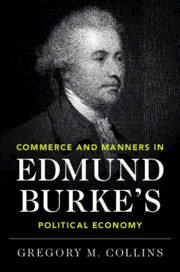Book contents
- Commerce and Manners in Edmund Burke’s Political Economy
- Commerce and Manners in Edmund Burke’s Political Economy
- Copyright page
- Dedication
- Contents
- Figures
- Tables
- Acknowledgments
- Introduction
- Part I Biography
- Part II Market Economies
- Part III The British Constitution and Economical Reform
- Part IV Foreign Trade
- 6 Account of the European Settlements in America, the British West Indies, and the Free Port Act of 1766
- 7 Observations on a Late State of the Nation and the Political Economy of Anglo-American Imperial Relations
- 8 Anglo-Irish Commercial Relations, Two Letters on the Trade of Ireland, and the Politics of Free Trade
- Part V India
- Part VI The French Revolution
- Conclusion
- Bibliography
- Index
6 - Account of the European Settlements in America, the British West Indies, and the Free Port Act of 1766
from Part IV - Foreign Trade
Published online by Cambridge University Press: 24 April 2020
- Commerce and Manners in Edmund Burke’s Political Economy
- Commerce and Manners in Edmund Burke’s Political Economy
- Copyright page
- Dedication
- Contents
- Figures
- Tables
- Acknowledgments
- Introduction
- Part I Biography
- Part II Market Economies
- Part III The British Constitution and Economical Reform
- Part IV Foreign Trade
- 6 Account of the European Settlements in America, the British West Indies, and the Free Port Act of 1766
- 7 Observations on a Late State of the Nation and the Political Economy of Anglo-American Imperial Relations
- 8 Anglo-Irish Commercial Relations, Two Letters on the Trade of Ireland, and the Politics of Free Trade
- Part V India
- Part VI The French Revolution
- Conclusion
- Bibliography
- Index
Summary
Chapter 6 explores Burke’s early views and legislative activities on foreign trade by analyzing Account of the European Settlements in America, which he coauthored with Will Burke. I explain how the Account offered some of the earliest glimpses into Burke’s conception of imperial political economy: the British Empire possessed the right to rule its colonial possessions, but its governance should be selective in regulating their internal affairs. Furthermore, the Account criticized the idea that the accumulation of gold was the best means to opulence, thereby challenging a core tenet of mercantilism. More important, the Account stressed that the character and fortitude of the English people would enable Britain to counter the imperial threat of its rival, France. In addition, Chapter 6 explores Burke’s leading parliamentary role in orchestrating the passage of the Free Port Act of 1766, which created six new free trade ports in the West Indies. Such legislative efforts showed that he was a champion of merchants and commercial liberty early on in his career in the House of Commons.
Keywords
- Type
- Chapter
- Information
- Commerce and Manners in Edmund Burke's Political Economy , pp. 209 - 247Publisher: Cambridge University PressPrint publication year: 2020

